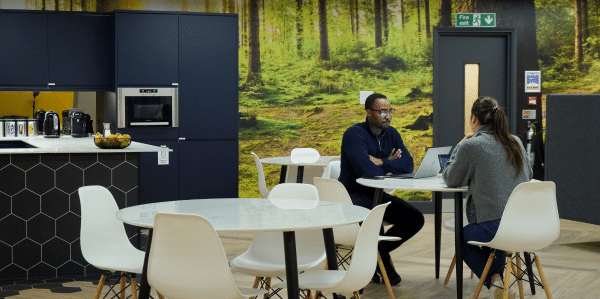Post-lockdown, the number of people working from home has skyrocketed. In 2024, home office statistics showed that 52% of organisations believe that hybrid working is the best way of supporting and retaining staff, but that doesn’t mean the office is a thing of the past, far from it.
While 50 of the largest UK employers say they have no plans to ask staff to return to the office on a full-time basis, most businesses prefer workers to spend some time on-site because there are benefits to working in an office rather than at home.
Before looking at the advantages of working in an office, it’s useful to look at some of the disadvantages of working from home, namely:
- The boundaries between work and home life blur and 27% admit they find it difficult to stop working at the end of the day
- It is much harder to collaborate with and communicate with colleagues
- Many workers, especially those who are young and single, find working from home lonely
- There are too many distractions at home, from parcel delivery through to household tasks that need to be done
- 12% of workers say that they find it hard to stay motivated when working from home
- And of those who work abroad, 7% say that they find it harder to work in different time zones to the rest of the team
Advantages of working in an office
Social side – one of the big pluses of working in an office is that it fosters social interaction making it perfect for collaboration and teamwork. There is an energy in the room when people sit around a table in real-life. Video calls have their uses, but nothing beats brainstorming in person.
In-person interaction also encourages bonding and strengthens teams and there is also the opportunity to learn from colleagues when you work together under one roof.
Infrastructure and resources – another big advantage to office working is having access to technology and equipment that may not be available in a home environment. Not everybody has a printer at home for example, and if they do, what happens when it goes wrong? They don’t have a department to call who’ll appear at the drop of a hat to fix it.
Work-life balance – it’s much easier to forget about work when you walk away from a physical office. Working from home makes it harder to unplug at the end of the day. It’s tempting to answer work emails after hours and do the odd task to take the pressure off for the next day. Before you know it, the lines between work and home life are distinctly blurred.
Ease of communication – when everybody is working in the same environment, it’s much easier to communicate en-masse meaning that decision-making processes are easier. Apps such as Slack enable group communication, but nothing beats an announcement in the office that everyone hears at the same time.
Personal and professional growth – an office environment encourages both personal and professional growth. It means people are exposed to leadership and mentoring opportunities and are also forced to learn how to work with others who are likely to have different perspectives.
Relationships built in an office environment are priceless and can advance careers. When you work in an office, you network with others daily.
Conclusion
Working in an office has many benefits, the most obvious being the ability to strengthen relationships, collaborate and brainstorm ideas. Some of the best ideas come when least expected – perhaps over lunch or a shared coffee during a break. When everybody is in the same place, the exchange of ideas is constant and creativity is maximised. At home, people tend to be more isolated and when they do collaborate via video calls, there are more constraints, i.e. the call is timed, it relies on the internet working well, plus social cues and body language are easy to miss.
Younger, single workers still view the office as a social environment. They expect to make good friends in the office and after work social gatherings are the norm. When you’re young and working from home, where you might not have adequate facilities or space, it can be both isolating and de-motivating.
Less experienced staff also benefit from leadership and mentoring opportunities which are easy to access in an office environment.
It’s also easier to feel like part of a team when you work together in a physical space. If everybody is at home, the workforce can seem disparate. Get in touch for more information on concierge office space in London.

Alida has run our Bank centre for 2 years and in that time formed great
relationships with our clients, while also becoming an expert of the local area,
so take some of the local tips from Alida.
You may also like...
Contact Us
Speak to one of our team today who would
be delighted to provide you with information,
discuss your requirements or book in a
viewing to see the office space for yourself.


